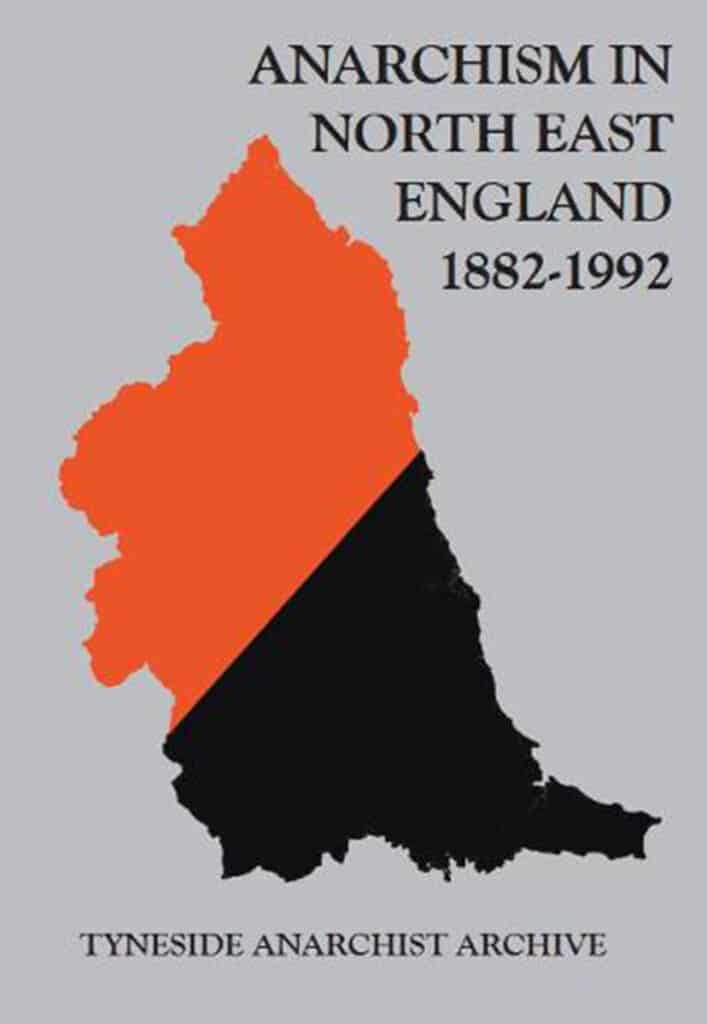Radical collectives have turned to a new phase of dealing with historical materials of anarchist activity. In the past years, printing and archive collectives all over the world are imagining new ways in which the history of anarchism is reclaimed from mainstream historians and sophisticated academic vocabulary. Likewise, Tyneside Anarchist Archive’s new book is a great example of this kind of action. Written from “the grassroots and from those at the forefront of activity” perspective, it covers in 505 pages and four chapters no less than 110 years of local struggle. In doing so, a great amount of information is backed by archive material (books, journals, zines and pamphlets) that can be further read and accessed online on their website.
The story begins in the 1880s, when anarchist Peter Kropotkin visited Newcastle to give a talk about repression in Russia, a visit that was shortly followed in the 1890s by the formation of the Clousden Hill Farm commune. Turning to the beginning of the twentieth century, the industrialized region of North East England has witnessed the rise of anarcho-syndicalist methods of action, with Chopwell anarchists supporting the miners strikes in Durham and opposing the First World War. In part two (1920-1950), the story turns to the iconic anti-fascist figure Tom Brown (1900-1974), who’s militant anarchism encouraged miners opposition to police and the government, as well as showing his involvement in blocking the rise of fascism in the area. During the Spanish Civil War, acts of solidarity were held across the region, such as the housing of refugee Basque anarchist children and the involvement in the CNT-FAI Spanish Aid Committees, together with Emma Goldman, Albert Meltzer and Marie Louise Berneri.
In part three (1950-1980), the flame of anarchism was kept burning by the establishment of Tyneside Anarchist Federation (TAF) in early 1963. Organizing went hand in hand with student’s protests, marches of solidarity with the liberation of Stuart Christie (i.e. member of the Anarchist Black Cross and editor of Cienfuegos Press and Black Flag) and publishing pamphlets on evictions, while occupying buildings in order to provide shelter for homeless people in a “Free Hostel system”. (p.206-208) The period also coincided with the beginning of the squatting movement and the local DIY anarcho-punk scene which began to form bands like Total Chaos and to organize gigs in the so-called “Garage”.
Part four (1980-1992) documents the fascinating history of the emerging anarcho-punk music collectives and radio stations that were organized around new venues in Sunderland such as “The Bunker” and “The Station”. The production of books, zines and anarchist literature was distributed through the “Days of Hope” bookshop, while the Newcastle Anarchist Group reported their activity in the Black Star and Earthworks. The formation of the Northern Anarchist Network (NAN) in 1986 brought together groups from several cities and explicitly urged them to take “racism seriously” and to fight racial prejudice both within the radical scene and across British society (p.353). Tensions between groups are also illustrated, as in the case of London based Freedom Press’ patronizing articles and correspondence. Others were involved in establishing the Tyneside Class War group and in the massive distribution of the famous Class War newspaper, offering practical information on resisting through non-cooperation to the “poll tax” and showcasing how gentrification and capitalism were perpetuated by the ruling parties. The book closes with the Tyneside Anarchist Group leaflet, which called for direct action against the state while urging that “together We can change things ourselves and improve our own lives, whether they like it or not!”(p.441).
Both the publishing and the events showcased in Anarchism in North East England are definitely inspiring and we hope more initiatives of this kind will follow in the near future. Keeping in mind that “this is our history, and this is the purpose of our history, this is our culture, a culture of resistance to the state and its enforced fallacies of indoctrination, control and coercion,” we look forward to building new futures.
With solidarity,
Anarhiva Collective
The ANARHIVA platform aims to document the little-known history of the penetration and spread of anarchist ideas in Romania, from the 19th century to the present day. You can check the archive on anarhiva.com








